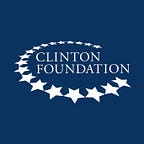Inverting the Norm: Women Leading Digital Health
During Women’s History Month at the Clinton Foundation, we were reminded that it’s important to recognize the progress we’ve made when it comes to achieving the full participation of women and girls across all sectors, as well as the gaps that still remain.
Data that was recently released in the Clinton Foundation’s Full Participation Report show that we have seen important advances in a variety of areas over the last 20 years. Women around the world are living longer than ever, and maternal mortality rates have nearly halved. According to recent findings in the State of Women in Healthcare Report, women are also making 80% of healthcare decisions for their families.
Yet despite important health gains, progress has been uneven. While women now outnumber men in universities, the industry norm in science, technology, engineering, and math fields is overwhelmingly skewed toward men. With the digital health space rapidly growing, this means that women are being left behind in developing important technologies that affect their everyday lives.
Yet despite important health gains, progress has been uneven. While women now outnumber men in universities, the industry norm in science, technology, engineering, and math fields is overwhelmingly skewed toward men.
Last August, the Clinton Foundation’s Health Matters Initiative recognized this growing disparity as an important opportunity to inspire more women to take leadership where health and technology intersect.
We asked ourselves: how can we make an impact and encourage more women to build careers in the digital health field? How can we ensure that technologists are building products focused on women’s health needs? To that end, we teamed up with Jawbone, Ace Hotel, and media partner SELF Magazine, to host the Women’s Codeathon Series this past year.
Our commitment to recruiting more female participants in our codeathons and by specifically focusing on women-related issues, we were able to achieve something extraordinary. At each of the two-day events, we inverted the industry hackathon norm. Rather than participation of over 70–80% men, the room was filled with 70% women. And the result? Over 20 innovative digital tools were built focusing on women’s health issues:
Our commitment to recruiting more female participants in our codeathons and by specifically focusing on women-related issues, we were able to achieve something extraordinary.
Feasted
To address the need for food access in underserved communities in and around New York City, Candace Williams, Angus McLeod, Muzi Gao, and Vivian Peng developed Feasted, a non-profit family meal subscription app that improves the nutrition of food insecure families. The app helps women and their families schedule, manage, and pay for subsidized nutritious meal solutions. At the same time, users gain direct access to food redistribution networks and government assistance programs that subsidize payments and tailor meal programs. Currently, the team is preparing to launch a pilot with 20 families in the South Bronx.
Safe.me
In Boston, our winning team developed Safe.me, a discrete way to send messages to friends and pro-actively seek help. Val Lee, Ying Cao, Dushanthi Pieris, and Nathan Roysden hacked into the convenience of the JawBone Up band to turn wearable tracking data into a signal that can trigger an action by a third party. With Safe.me, women can discreetly send signals to friends if they want to meet, leave, or change a situation where they may feel unsafe.
Fitagochi
The Los Angeles winners created Fitagochi, a mobile app that promotes a continuously active lifestyle by reducing long periods of inactivity. Diana Meehan, Maksim Gill, Jacqueline Bae, Kristi Grassi, and Stephen Corwin collaborated to encourage women to overcome sedentary lifestyles. App users can choose a veggie-shaped avatar to learn more about their daily physical activity. The more you stay active, the happier your avatar becomes, turning physical activity into a fun, interactive, and personalized game.
These codeathons brought together extremely innovative and passionate women who led teams to create viable digital health solutions to move women’s health forward. It is now up to women and men alike to take responsibility to build diverse teams, develop female-friendly policies in the workplace, and provide mentorship for entry-level tech jobs and career advancement opportunities. Though we still have more work to do when it comes to fully inverting the norm in the digital health space, we’re hopeful that these women’s health-focused codeathons will help bridge some of the gaps that remain.
